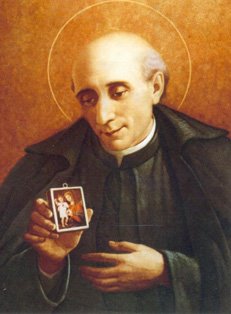
"Holiness, is simply to do God's Will."
These simple words were spoken by a simple Priest yet in this one sentence contains the meaning of what being a sincere Catholic is, to do God's Will.
Vincent Pallotti was born in the year 1795 in Rome. His parents, Peter and Maddalena Pallotti were very devout Catholics and passed on this love for their faith to their children. From his early days there was nothing to denote that Vincent would be any different from any other boy in his region. Especially as at first Vincent struggled with his studies and seemed unable to understand the most simplest things in matters of Faith. This worried his mother so much she sought out the advice of a Priest, who then consoled this erstwhile mother and advised her to begin a novena to the Holy Spirit for the illumination of Vincent's mind to grasp the Mysteries of Faith and the Teachings of the Catholic Church. One can only say the Novena was a success.
Even though Vincent went from being rather obtuse to becoming the head of his class the one thing that Vincent knew from the beginning was that love did not require a great intelligence it required greatness of heart, this Vincent had with abundance from the beginning. His love for the poor and destitute would stay with him his entire life, but it was not a simpering show of love for the poor. Vincent's love of the poor was as real as his love for God, he understood from the beginning to love the poor is to love God. He treated the poor even from a young age with the greatest respect and treated them as if he were serving Jesus Himself, there were no 'airs and graces' from Vincent just a profound and deep empathy with those who's struggles were incompatible with the Churches Teaching on charity.
Vincent even from his youth encapsulates what true charity is and it is not a giving of things to the poor it is a giving of self to those in need. Charity is Spirit not goods. This love for the poor and also the mire of sin he could see enveloping the lifestyles of those who did not know God only increased Vincent's longing to help them in a meaningful way. So Vincent began acts of Penance by denying himself the rich dishes which his mother cooked and instead choosing to eat little and plainly. Once again his mother Maddalena worried for this loving son of hers and again chose to confide her concerns to her Priest whereupon the Priest replied, "Let us leave Vincent undisturbed. It appears to be a higher call than we have been given. It seems to come from God."
All throughout his youth Vincent had a great longing to the Priesthood and also nurtured a great devotion towards the Blessed Mother through the youth groups he had joined. At an early age he joined the Sapienza University where he studied theology. This was also a time where the Catholic Church and its people were undergoing a persecution by the secular government and from this Vincent decided courageously to wear clerical habit throughout his years of studying in the Seminary.
At the age of 23 years Vincent's dream was fulfilled as he was Ordained into the Priesthood and gained his doctorate in theology. Father Vincent though was not a Priest with his head in books his first true love was always for the people mainly those who most needed his help. He resigned his professorship and instead devoted himself to pastoral work amongst his people, the poor, sick and lonely.
Once again though Father Vincent would prove that his love for the poor was not a theoretical one but one of practicalities as he organized schools who could help the poor gain professions in the fields of shoemaking, carpenters, gardeners, coachmen etc. He was so zealous in his love and devotion to help the poor that many were calling him the 'second Philip Neri'. Vincent was always himself, this is a burning love he had held within him from his youth. He was simply putting into practice the love and the true meaning of charity which is to give the poor their dignity. Father Vincent also gave away his own belongings when beggars would knock at his door even at one time giving away his own bed! There was no end to this Priest love just as there is no end to the love God has for His children.
Vincent understood that when a Priests love grows cold towards the poor, lonely and dispossessed then the heart has also grown cold towards God Himself. Vincent's love was not cold, he had a passionate love for ALL people not in a whimsical sense but in the Truth that peace and happiness can only be found with God through His Church.
It would not be long before Father Vincent's efforts were needed elsewhere and he was approached by the diocesan authorities who needed the help of this passionate Priest in the area of Trastevere. This was an area which had many poor people and the youth who had been given very little in the way of instruction were running wild. It would take the erstwhile and loving efforts of this valiant Priest to reach these hardened and cynical youths. What lay at the heart of Vincent was a belief in peoples goodness if only they were given hope. It was this that Father Vincent wanted to give to these poor and roughened youths, hope for themselves and a restoration of their dignity through hard work.
The roughened youth of the area took to this Priest obvious holiness without the false or patronizing largesse of the wealthy. Father Vincent was able to connect with these young people and bring hope back into their lives as they struggled to make the best of themselves and to strive to live virtuous lives despite their poverty. Through the work of Father Vincent the rebellious youths were given back their self respect and encouraged to rise above their birth and live lives of piety and of good works.
Through these years Father Vincent also began a new movement called the Union of The Catholic Apostolate. The charism was to attract those who did not know the Catholic faith and to help others return to the faith of their fathers. It was an outreach mission to touch and reignite the flame of the laity towards the Catholic Church through a true spirit of charity towards their neighbor. All the people who joined this Apostolate were also to pray for the work of the Holy Father and for the Church as it missioned to the needs of the people all over the world. Pope Gregory XVI was greatly moved and approved of this new movement which gained members by the hundreds.
Father Vincent Pallotti had the uncanny brilliance to re-ignite the flames of the faithful that had grown dim from lack of heat. In order to re-ignite these flames one must draw close to God through prayer and good works and the receiving of the Sacraments. This deeply devout Priest simply re-awakened the love of the faithful towards their vibrant Church which had come alive through the work of Father Vincent, and the example he gave to all through his own life and his love for God and the Church.
Just when everything was going along smoothly and Father Vincent was working as diligently as he could an epidemic spread through the area, the dreaded disease of cholera. Personal tragedy would now cloud Father Vincent's life as his own father succumbed to this deadly disease as did his friends Father Fazzani and Father Gaspare del Buffalo. It was a blow as children lost their parents and parents lost their children. The poor and destitute roamed the streets in search of lodging and food, as the town was ravaged by this deadly outbreak.
Father Vincent was heartbroken at the scene he saw day after day as people walked around aimless and in abject poverty and young girls were driven onto the streets to make a living anyway they could. It was like a knife through this loving Priest heart to see such a calamity and he drove himself day and night to try and alleviate the pain of the suffering people.
This most compassionate Priest along with his friend Mr. James Salvatie acquired a small residence that had housed former seminarians. It was here that he brought the young girls who had been orphaned through this catastrophe in order to save their virtue and provide a stable and safe place so they could heal from the pain of losing their loved ones. Father Vincent encouraged a group of women to instruct these young girls in the domestic sciences so they could one day gain employment and become self sufficient, the orphanage was given the name Pious House of St Agatha. These lady volunteers would later become the foundation of the Order of the Pallottine Sisters.
Throughout his life Father Vincent Pallotti did not dignify poverty in its rawness and starkness, but he did give back dignity to the poor for it is not a sin to be poor...He gave the poor a chance to better as they became better and to rise above their circumstances rather than be trapped by them. He visited the imprisoned spent time with those who were condemned to death and would hold the Crucifix before them as they were executed. He visited hospitals and even the homes of atheistic revolutionaries in order that they obtain the Last Rites even under disguise. This simple Priest gave the poor....hope..and shared his compassionate love with them which is the key to God's Heart.
Father Vincent Pallotti died in the year 1850.
Saint Vincent Pallotti was canonized in 1963 by Pope John XXIII.
Peace of Christ to ALL
Copyright © 2006 Marie Smith. All rights reserved.

